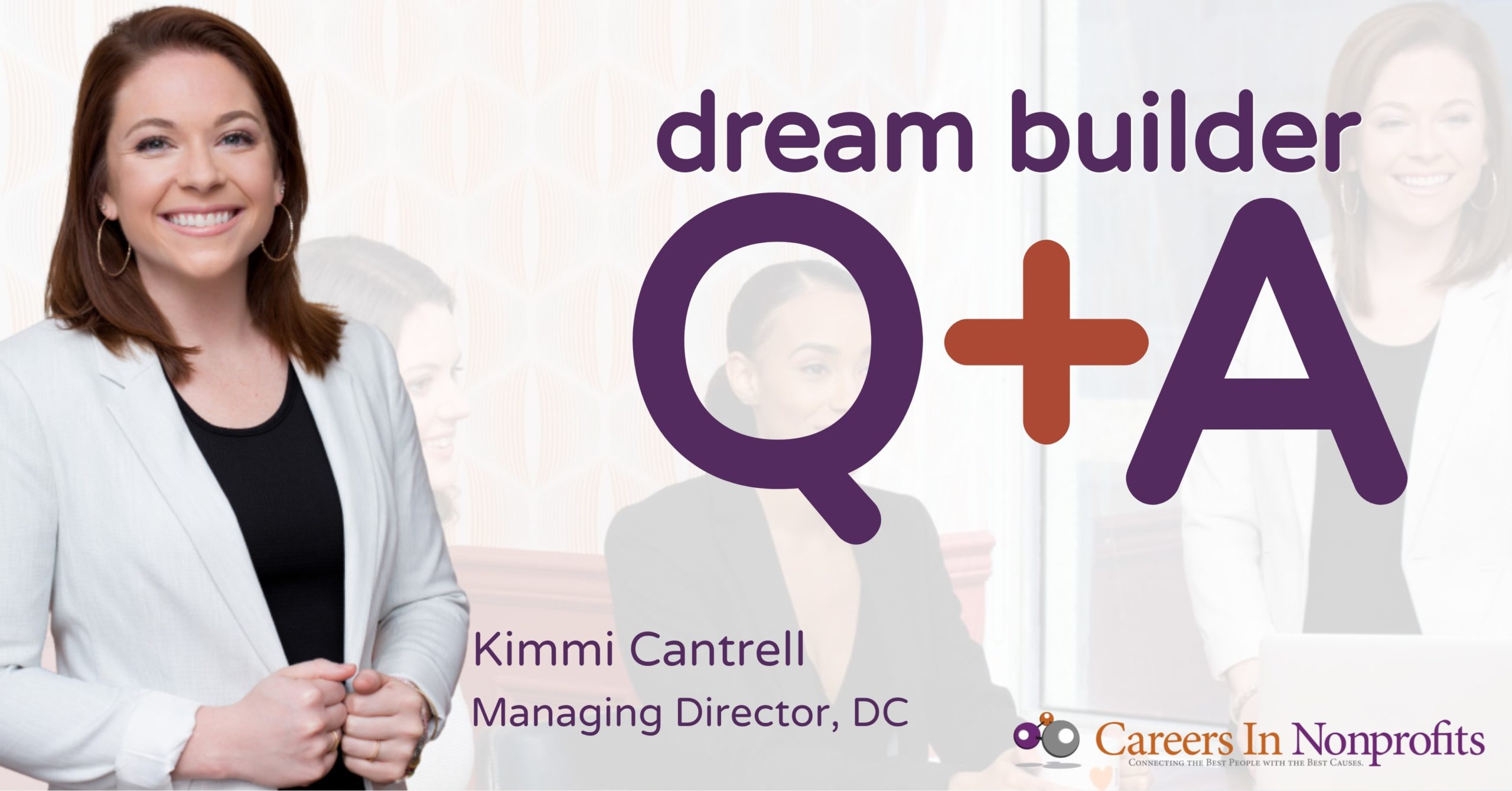
Getting a Job in Nonprofit Leadership—What Nonprofits Need to See
Living and working as a nonprofit staffing director in Washington DC—Kimmi Cantrell works directly with some of the sector’s leading nonprofits and associations. She’s placed rising Nonprofit Leaders with 501(c)(3)’s like the American Foundation for Suicide Prevention, Bat Conservation International, Montgomery County Coalition for the Homeless, and Prison Fellowship International.
1.
No one is 100% ready for anything in life. Was there any nerves or butterflies the moment you accepted your first leadership role with Careers In Nonprofits?
Feeling I was prepared, I still felt absolutely nervous.
But I think that’s a good thing. Because sometimes when you’re feeling nervous, you think that means you’re afraid, which then means that you’re not capable. And it falsely becomes this downward spiral of negative feelings. When in reality, stepping out of your comfort zone feels uncomfortable.
Beginning a leadership role, means trusting yourself enough that no matter what happens, you will land on your feet. It’s about finding the butterflies that fill you with excitement. The kind that helps you make decisions that people are counting on. Decisions that are going to help make the lives of people around you better.

2.
Many people approach you hoping to make a similar breakthrough in their career, what’s one thing they can do today—to make that dream a reality?
One thing that is most important is gaining clarity on what you genuinely want to do.
For example, if you’re not convinced that stepping into a leadership role is going to serve you long term—that’s a red flag. Probably the biggest mistake nonprofit professionals make is assuming that because the next step is leadership, that’s what they need to do.
But if that’s not your passion, not your strength, falling into what society has mapped out for you—won’t make you happy. Understanding what you want out of your career, and where you believe you are genuinely adding the most value, whether that is in a leadership role or not—tends to bring out the best version of yourself and your team.

3.
Can you point to a special trait you’ve observed—which nonprofits love seeing when hiring a leader?
A couple of things come to mind. First, a strong level of individual agency.
So being able to take authority over your decisions and stand behind them with confidence. That’s invaluable because it’s how you earn people’s trust, and it’s how you make a team start believing in you.
Also, as simple as it may sound—hiring managers frequently express how they need somebody pleasant to work with. That human factor tends to get lost when candidates become overly focused on selling their experiences and accomplishments.
4.
How can candidates let their experience shine despite not having held a leadership role before?
I am biased, but this is the benefit of working with a recruiter.
Because most of what we do is help clients understand why ‘Person X’ would be great for their role, regardless of their resume.
For example: if somebody is looking for a leadership role, it makes sense for us to be able to advocate for the candidate saying, “We know that you wanted a resume that looked like XYZ, but here’s someone who may pique your interest. And this is why. What do you think?”
Getting someone to personally vouch on your behalf is rare. Because when you apply for a job on a search engine, there’s no advocacy. Only an email confirmation. It’s one more resume in stack of a thousand others. Essentially, this the difference that helps you breakthrough to the next level.

5.
During the pandemic, have you seen a rising demand for nonprofit leadership roles or just the opposite?
We’re seeing a rising demand for nonprofit leadership.
What the pandemic has shown us is that leadership is more valuable than what we gave it credit for. Having strong leadership is what has helped many organizations survive this time and keep their lights on. And you can’t put a price on that.
6.
Would you say there is a winning recipe or a “secret sauce” for executive job seeking—one that explains why nonprofits end up choosing the candidates that they do?
Having success you can stand on, makes it a lot easier to sell yourself.
But a close second are candidates who take their jobs seriously, are very polished, and who are always coming fully prepared—asking all the right questions.
Showing up to an interview saying: “I don’t know much about your organization, tell me more” versus the person who says: “I know these things about you. And here’s where I think I could add value.” That’s make or break.
Frankly, you’re being given the floor by key decision makers to speak on the future of their organization. Showing up as an active participant in this conversation, sets you apart from everyone else.
7.
Today, so many leaders have causes they feel strongly about. What’s the key to branding yourself towards a cause or mission you love?
Putting yourself in the spaces that matter to you can be overlooked.
For an example, if you’re wanting to be an environmental advocate, but you’re not talking to environmental professionals or environmental thought groups, then you’re missing opportunities.
Merging yourself into the field you’re passionate about is what’s going to move the needle for you. Because the more people you meet, the more your network grows, the more opportunities you receive, the more paths that are opening, it all comes back full circle.
8.
Any parting advice for future leaders hoping to take the leap during the spring or summer?
Start writing down the value that you add.
This is value you bring to an organization, and feel so confident about that nothing can shake it.
As soon as you consciously say: “I am adaptable, I am dedicated, and I am flexible” but also knowing when and where you are not, then there’s nothing that can stop you from believing that those are your traits, and showing up as a person fully embodying them.
Being clear here, will introduce you to new opportunities that you might not have seen. Because when you’re so firm in who you are, and how you show up—the rest will fall into place.

